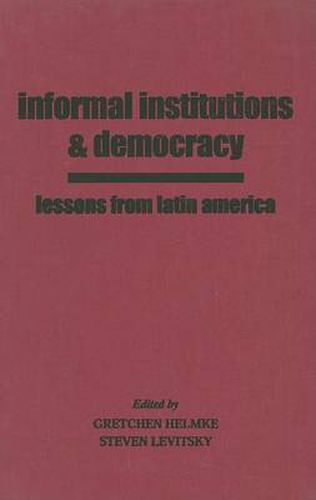Readings Newsletter
Become a Readings Member to make your shopping experience even easier.
Sign in or sign up for free!
You’re not far away from qualifying for FREE standard shipping within Australia
You’ve qualified for FREE standard shipping within Australia
The cart is loading…






This volume analyzes the function of informal institutions in Latin America and how they support or weaken democratic governance. Drawing from a wide range of examples - including the Mexican dedazo, clientelism in Brazil, legislative ghost coalitions in Ecuador, and elite power-sharing in Chile - the contributors examine how informal rules shape the performance of state and democratic institutions, offering fresh and timely insights into contemporary problems of governability, unrule of law, and the absence of effective representation, participation, and accountability in Latin America. The editors present this analysis within a fourfold conceptual framework: complementary institutions, which fill gaps in formal rules or enhance their efficacy; accommodative informal institutions, which blunt the effects of dysfunctional formal institutions; competing informal institutions, which directly subvert the formal rules; and, substitutive informal institutions, which replace ineffective formal institutions.
$9.00 standard shipping within Australia
FREE standard shipping within Australia for orders over $100.00
Express & International shipping calculated at checkout
This volume analyzes the function of informal institutions in Latin America and how they support or weaken democratic governance. Drawing from a wide range of examples - including the Mexican dedazo, clientelism in Brazil, legislative ghost coalitions in Ecuador, and elite power-sharing in Chile - the contributors examine how informal rules shape the performance of state and democratic institutions, offering fresh and timely insights into contemporary problems of governability, unrule of law, and the absence of effective representation, participation, and accountability in Latin America. The editors present this analysis within a fourfold conceptual framework: complementary institutions, which fill gaps in formal rules or enhance their efficacy; accommodative informal institutions, which blunt the effects of dysfunctional formal institutions; competing informal institutions, which directly subvert the formal rules; and, substitutive informal institutions, which replace ineffective formal institutions.